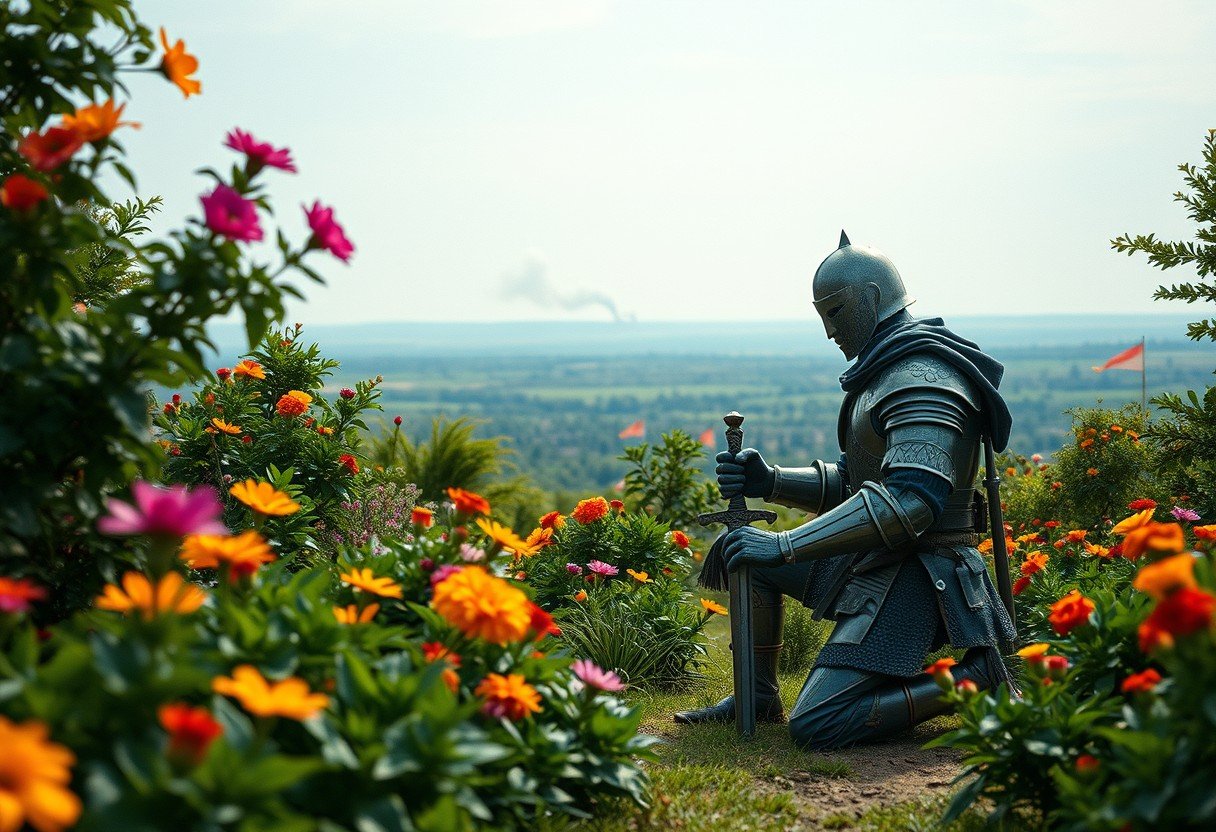Have you ever considered the old saying, “It is better to be a warrior in a garden than a gardener in a war”? This powerful idea is about being ready for life’s challenges before they arrive. It teaches us to build our strength, skills, and resilience during times of peace. By embracing this philosophy, you can navigate unexpected problems with confidence and protect the calm, beautiful life you have worked so hard to create.
What the ‘Warrior in a Garden’ Philosophy Really Means
This philosophy is not about seeking conflict. Instead, it is about preparedness. The “garden” represents your peaceful, everyday life—your career, family, and personal well-being. The “warrior” represents your inner strength, skills, and readiness to face trouble.
Being a warrior in a garden means you enjoy the peace but are never caught off guard. You have the discipline and courage to handle a crisis, whether it is a sudden job loss, a personal emergency, or a difficult confrontation. It is about having the capacity for strength, but the wisdom to use it only when necessary.
This mindset allows you to live without fear. You can fully appreciate the tranquility of your “garden” because you know you have the tools to defend it if a threat appears. It is the ultimate balance of serenity and strength.
How to Cultivate a Warrior’s Mindset in Daily Life
Adopting a warrior’s mindset is a practical process that builds mental and emotional resilience. It is about training your mind to remain calm and focused under pressure, much like a trained soldier. This does not require you to be aggressive; rather, it encourages a disciplined and strategic approach to life’s obstacles.
Your psychological preparedness is just as important as any physical skill. It involves understanding your own emotions, fears, and motivations. By developing mental fortitude, you can face uncertainty with confidence instead of anxiety. This practice turns setbacks into opportunities for growth.
Here are a few ways to build this mindset:
- Practice Discipline: Set small, achievable goals every day. This could be a workout routine, a reading habit, or a commitment to learning a new skill. Consistency builds the mental muscle of discipline.
- Embrace Discomfort: Step outside your comfort zone regularly. Trying new things or facing small fears prepares you for larger, unexpected challenges.
- Develop Emotional Control: Through practices like mindfulness or meditation, you can learn to observe your emotions without letting them control your actions. This is crucial for clear thinking in high-stress situations.
This training ensures that when challenges arise, you respond with thoughtful action rather than panicked reaction.
The Gardener’s Wisdom: Nurturing Your World
While developing the warrior is important, you must not forget the gardener. The gardener is the part of you that nurtures, creates, and cultivates. It represents your ability to build relationships, foster growth in your community, and create a stable, beautiful environment.
The gardener understands that real growth requires patience and care. You cannot rush the process of building a career, raising a family, or achieving personal goals. A true warrior protects something valuable, and the gardener is the one who creates that value. Without a garden to protect, the warrior has no purpose.
This role teaches you compassion, empathy, and the importance of stability. It is about tending to the soil of your life, ensuring it is rich and healthy, so that good things can flourish. This nurturing aspect prevents the warrior from becoming cynical or destructive.
Finding the Right Balance Between Strength and Peace
The true power of this philosophy lies in achieving a delicate balance between your inner warrior and your inner gardener. One cannot thrive without the other. Strength without compassion becomes cruelty, while peace without the ability to defend it is just fragility.
This balance is reflected in the duality of human nature. We all have the capacity for both aggression and gentleness, for logic and creativity. Acknowledging and integrating these opposing forces makes you a more whole and effective person. This equilibrium empowers you to navigate life with both grace and resilience.
Here is a simple breakdown of the two mindsets:
| Aspect | Warrior in a Garden | Gardener in a War |
| Mindset | Proactive, prepared, and calm | Reactive, unprepared, and fearful |
| Focus | Cultivating skills while enjoying peace | Survival and constant stress |
| Outcome | Resilience and the ability to protect | Vulnerability and potential loss |
By understanding this table, you can see why being prepared in peaceful times is the more strategic and fulfilling way to live.
Why Being a Gardener in a War is a Losing Battle
Imagine trying to plant seeds in the middle of a battlefield. Your focus would be entirely on survival, not on growth. This is the reality of being a “gardener in a war.” When you are unprepared for conflict, any crisis can overwhelm you, forcing you into a purely defensive and reactive state.
In this position, your creative and nurturing potential is stifled. You spend all your energy just trying to stay afloat, with no room left to build, create, or plan for the future. Your dreams and goals are put on hold because you lack the skills and mindset to navigate the chaos effectively.
This is why the adage is so profound. Waiting until a crisis hits to learn how to handle it is a recipe for disaster. By building your warrior skills during times of peace, you ensure that you can protect your garden and continue to cultivate it, even when storms gather on the horizon.
Frequently Asked Questions about the Warrior in a Garden
What does “warrior in a garden” mean for my career?
In your career, it means continuously learning new skills and staying adaptable even when your job is secure. This preparedness allows you to navigate industry changes, company restructures, or unexpected job loss with confidence rather than panic.
Is being a warrior about physical strength?
Not necessarily. While physical fitness is a component of resilience, the warrior mindset primarily refers to mental and emotional strength. It is about discipline, courage, strategic thinking, and the ability to remain calm under pressure.
How can I start developing a warrior mindset today?
Start small. Choose one area of your life where you can practice discipline, such as a consistent wake-up time or a daily 15-minute walk. You can also face a small fear, like speaking up in a meeting, to build your courage.
Why is the “gardener” aspect just as important as the “warrior”?
The gardener represents your purpose. It is the part of you that builds a life worth protecting—your relationships, passions, and community. Without the gardener’s nurturing spirit, the warrior’s strength has no positive direction.
Can you be too much of a warrior and not enough of a gardener?
Yes. A person who is all warrior and no gardener may become paranoid, aggressive, or isolated. They see threats everywhere and forget how to enjoy peace, nurture relationships, or create beauty in their life. Balance is essential.








Leave a Comment